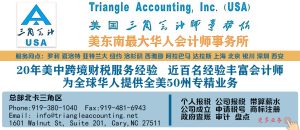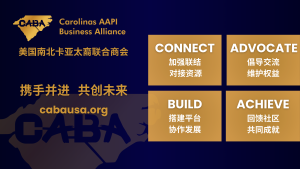



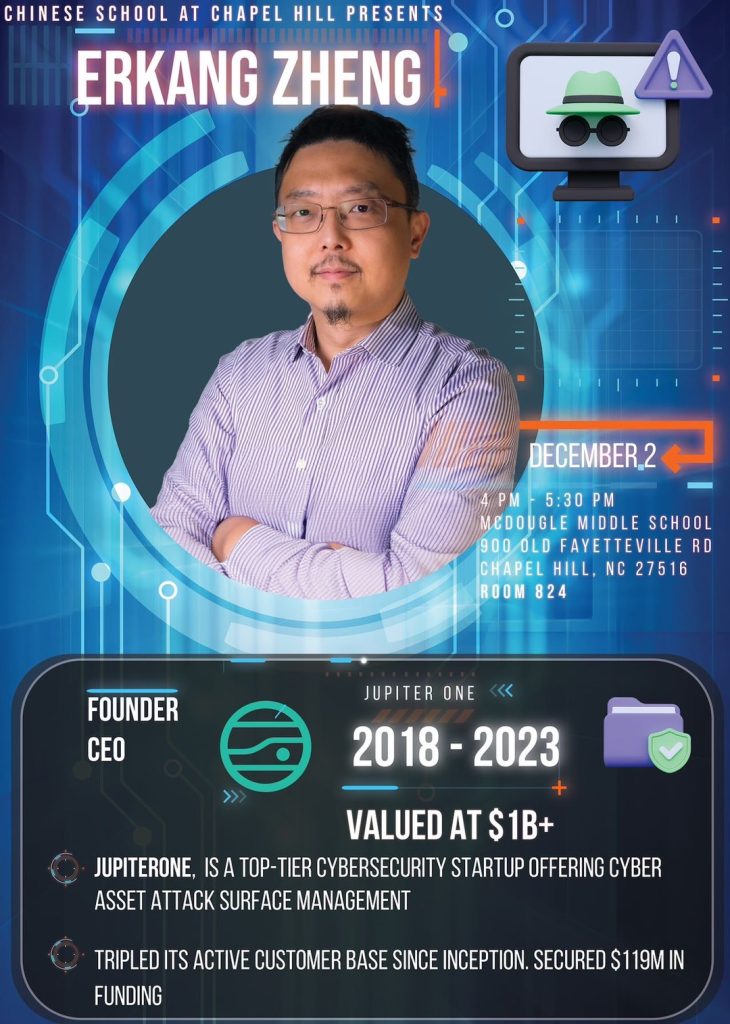
- 日期:2023年12月2日
- 地点:教堂山中文学校
【华e生活特约青少年记者王宣宣(Caroline Wang)报道】
郑尔康,JupiterOne的创始人兼首席执行官,12月2日在教堂山中文学校做了一个演讲,不仅仅展示了未来网络安全的冰山一角。他的旅程,从北卡州立大学工程学院的学生到领导一家价值十亿美元的公司,是一个独特的故事,蕴含着比通常的企业晋升更令人惊讶的见解。通过分享他作为工程师、顾问、首席执行官和终身学习者的经历和心得,郑尔康坦言相授的建议让出乎听众意料:并不是所有人都应该追求创业。
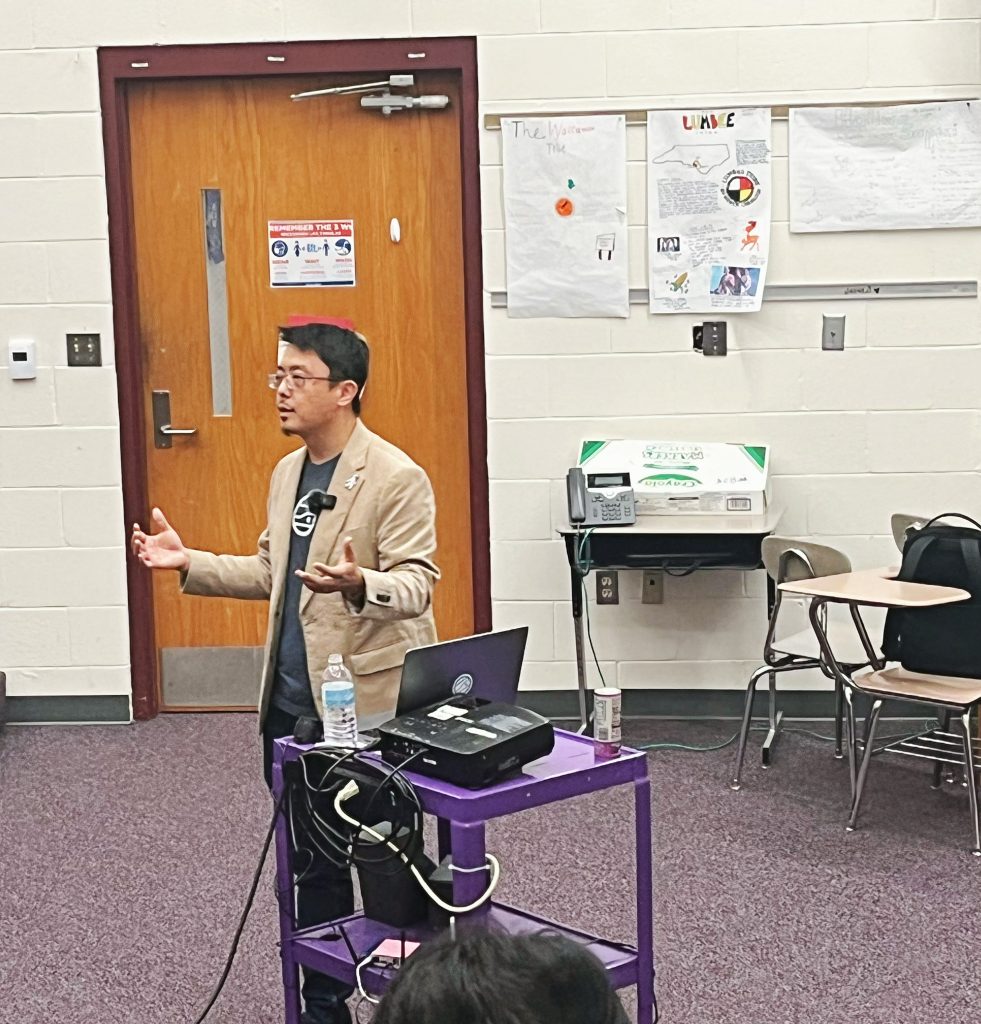
启航:从北京到凯瑞
郑尔康的旅程始于北京,后来在广州展开,他在那里度过了青春时光。在演讲中,我和观众中的一些人都注意到郑在非母语的情况下对英语的卓越掌握,他在演讲中将这归因于在祖母的早期英语教育,和职业生涯持续实践中置身的英语环境。作为一名杰出的学生,郑在北卡州立大学获得了计算机科学的学士和硕士学位。自2000年以来,郑一直与妻子和两个儿子一起在凯瑞定居。
毕业后,郑的职业生涯迎来了一个令人印象深刻的转折,他在思科获得了首席工程师和QA主管的职务。然而,在三年后,他在一次裁员中失业。这一转折,赋予了他应对未来挑战所需的韧性。
创业挫折和拥抱失败
郑尔康强调了从成功和失败故事中学习的重要性,成功的经验和失败的教训同样宝贵。
他回顾了他在Stonewall Networks担任首席安全架构师的两年,由于资金不足,该公司停止运营。随后,他冒险进入Refense Technologies担任首席技术官,仅在一年后目睹了该公司的关闭。
尽管遇到了这些挫折,但郑认为,这些经历为JupiterOne的成功提供了宝贵的经验教训,使他能够避开过去曾遇到的陷阱。
借助IBM走出舒适区
当郑尔康转向在IBM担任高级管理顾问的新角色时,他有意识将一只脚踏出自己的舒适区,不仅仅是为了适应一份新工作,还不断地与各种客户交谈,从而提高了他在商业环境中驾驭人际关系的能力。他说,与客户谈论的话题可以从体育到表演再到家庭,这意味着他必须适应。
这种有意走出舒适区的举措是转变性的,使他能够建立宝贵的联系,获得新技能,并在IBM的五年中在四个不同的职位上积累经验。从中获得的成长促使郑最终认识到,是时候迈向人生的下一个阶段了。他将利用这些见解进一步推动他职业生涯和JupiterOne的发展。
找到平衡点和改变视角
在富达(Fidelity)工作的那段时间,郑也经历过一番历练:有时他会在深夜与经理就任务和实施产生分歧。这给他带来了很多困扰。郑学会停下争论,退一步,以更深思熟虑的方式处理冲突。
他想要传达的一个关键教训是,在任何争论中,双方都可能有合理的观点。争论不是为了证明谁对谁错,而是找到共同的基础去实现团队的共同愿景。郑认为,以这种方式解决冲突对于建立一个合作紧密的团队至关重要。
在这一理念的指导下,从最初的三名成员起步,他成功地组建了一个由50名软件安全专业人员组成的团队。郑的角色不仅仅限于团队建设,他还通过开发四项专利在创新方面做出了显著贡献。在富达的那段时间,他充分展示出有效解决冲突、在促进团队增长和创新解决方案方面的重要性。
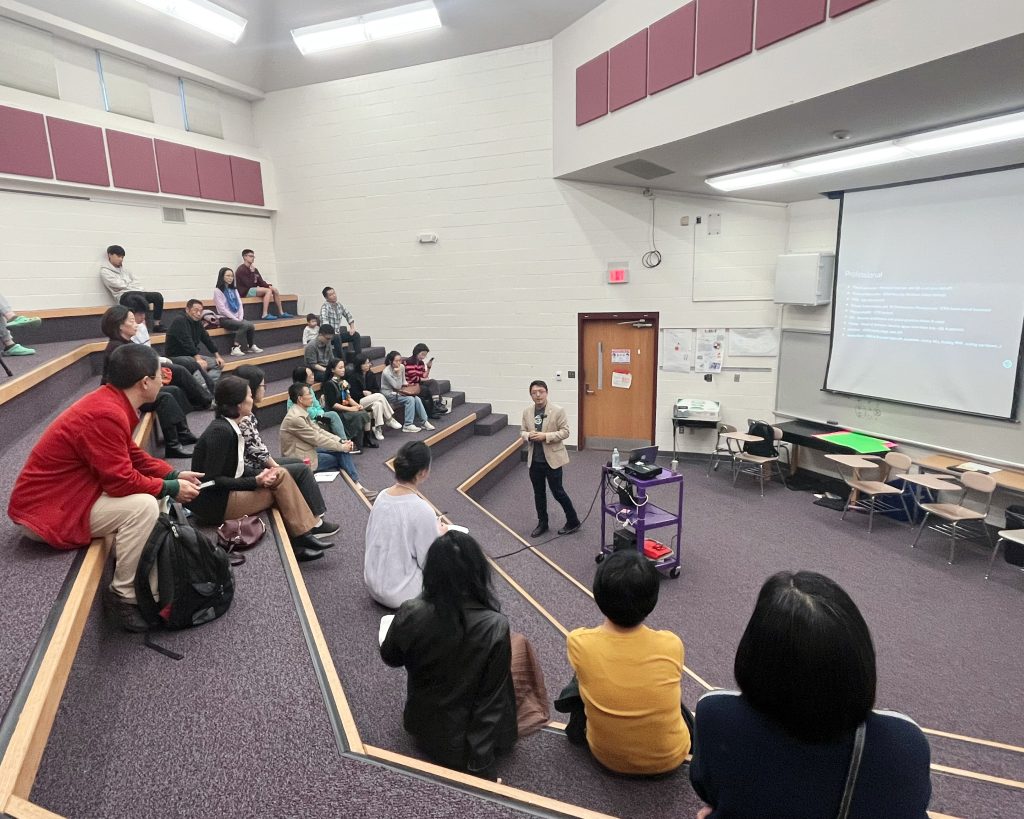
JupiterOne赖以成功的支撑
回到现在,随着郑踏上企业家的冒险,创办了JupiterOne——专注于云原生网络资产攻击面管理的初创公司——这对他来说标志着一个重要的篇章。
郑在JupiterOne的成功不仅依赖于他的技术和企业能力,还依赖于他在整个职业生涯中与IT和商业高管建立的网络。借助这些联系,郑为JupiterOne找到了资金和宝贵的合作机会。
JupiterOne的未来愿景
展望未来,郑分享了JupiterOne未来,突出了人工智能在塑造网络安全领域的关键角色。一个必然趋势是,哪怕预算变得更紧张,网络安全仍然保持着作为首要任务的地位。郑探讨了人工智能如何提高JupiterOne提供的数据,提供更深入的洞察力。然而,他也警告了潜在的危险,强调了网络安全需要保持警惕,以防止人工智能的潜在滥用,提醒我们人工智能可能被恶意使用,比如网络钓鱼者、黑客和“海盗”。
郑的前瞻性视角中引人注目的一个方面是他敏锐的洞察力,他能够在挑战中找到机会。例如,大流行病成为一个意外的途径,可以在不离开家的情况下获得许多合作伙伴关系。
他还谈到了建立可持续的公司结构的重要性。值得注意的是,他表示不希望永远领导自己的创业公司,而是要建立一个强大的员工和领导层框架,持续推动实现他的愿景和使命。
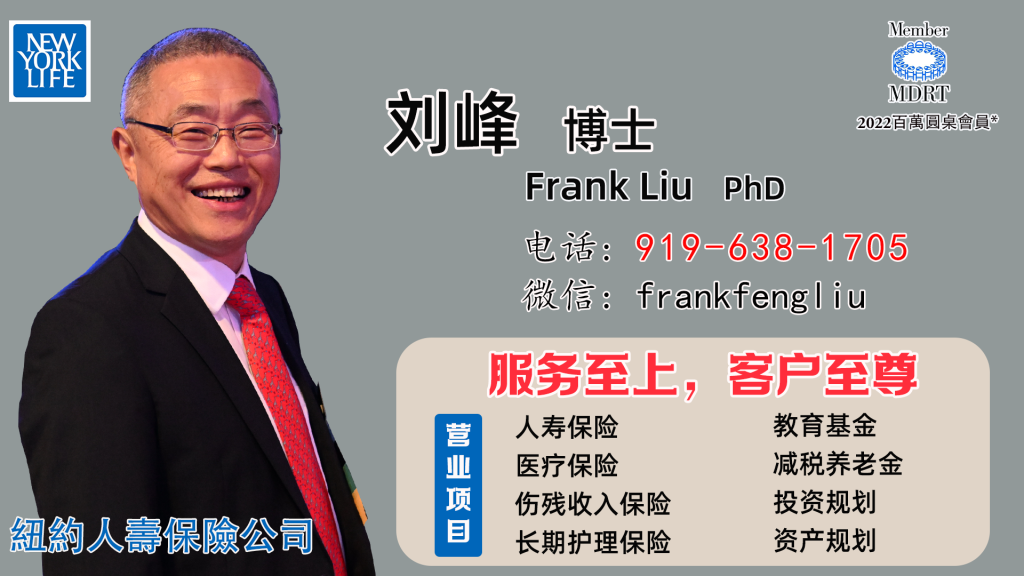
给渴望创业者的忠告:回头是岸
郑尔康对渴望成为企业家的人的劝阻揭示了这一领域常常被忽视的挑战。他幽默地将首席执行官的角色称为“首席万事官”(Chief Everything Officer),指的是所有职责都汇聚到领导者身上的无数责任。
他给予的忠告是,在冒险创业之前,必须想好了,他要做什么,是不是可以投入大量的时间,有没有能力肩负所有的责任。在公司人手不足的情况下尤其如此。
实践经历告诉他,对创业感兴趣的人,要仔细考虑他们是否真正准备好迎接前面严峻的旅程。如果没有,他说,返航将更加值得。尽管面临困难,作为他自己,郑尔康说,如果让他回到过去重新选择,他仍会义无反顾。
给创业家的两方面建议
对于渴望成为企业家的朋友,郑分享了个人建议,为团队建设和决策提供了路线图:
构建你的团队:
确定团队中的核心成员至关重要,郑强调了信任和共同责任的重要性,尤其是联合创始人之间非常必要的个人联系,以最大程度地促进合作。郑强调,你不能独自做出每个决定,需要信任的合作伙伴和员工。郑坚持让自己周围的人分享你的激情和承诺,尤其是在充满挑战的时期。更好的是,你的团队中总是有比你更优秀的人,这会提升整个工作环境。
此外,技术实力总是很重要的,但你的团队的需求会在你创业的不同阶段发生变化。在早期,技术能力可能是必不可少的,而后期阶段可能需要熟练的工作流程管理人员。
做出艰难决策:
郑对于做出困难决策的实用建议包括,寻求那些在类似情况中成功的人的指导,与同事们交流以获取多样化的观点,并利用数据从各种来源提取关键见解。最重要的是,他强调需要坚韧不拔的决心,能够在艰难时期保持雄心壮志、动力、精力和沉着冷静。
最后两个创业锦囊
理论上可行的东西,在实践中往往证明要复杂得多,类似于产品的构思和企业的整体发展。郑主张毫不动摇地关注后者。
要保持可持续的步伐和能量,这不仅是为了避免倦怠,也是为了培养对手头工作的真正热爱。郑尔康鼓励好奇心和不断探索的精神,强调真正的成功是让激情推动创业旅程的每一步。
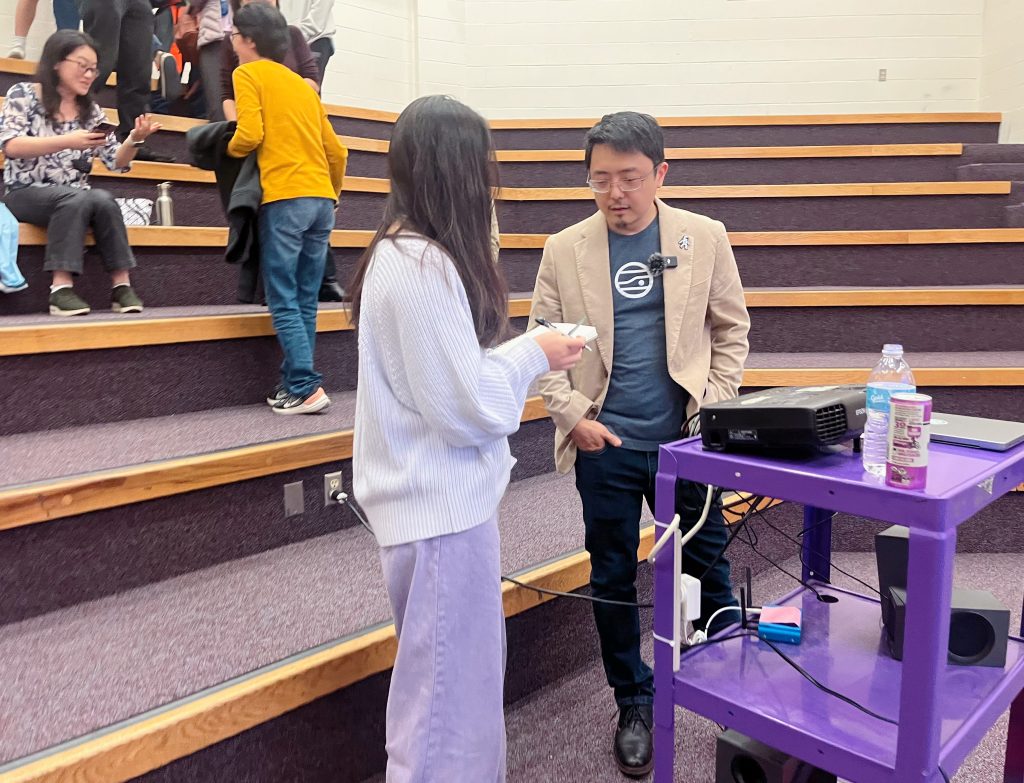
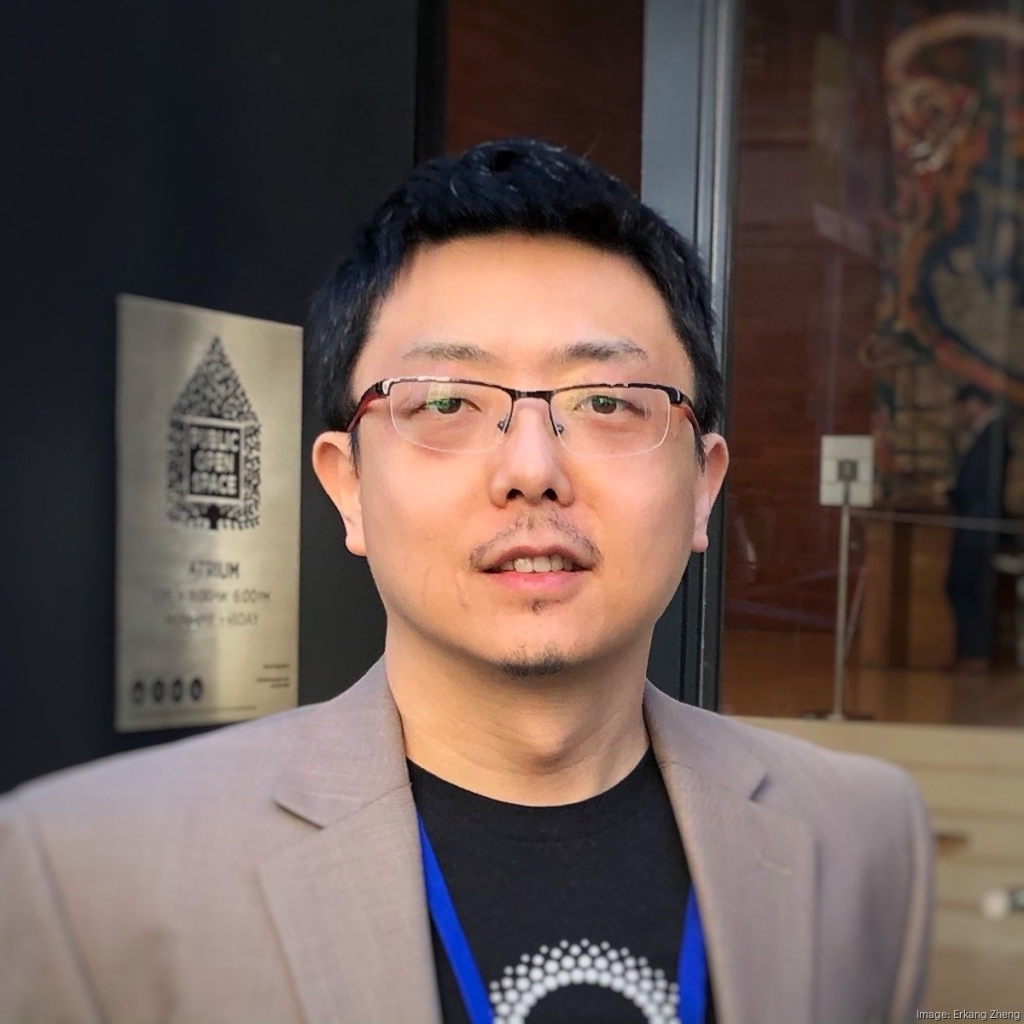
郑尔康简介
来自北卡州立大学官网
郑尔康是快速发展的网络安全初创公司JupiterOne的创始人兼首席执行官,该公司推出了首个云原生网络资产攻击面管理平台。自成立以来,JupiterOne的活跃客户群增加了两倍,从顶级投资公司筹集了1.19亿美元的资金,从而提高了其估值,团队规模扩大了四倍。
他是《三角商业杂志》(Triangle Business Journal) 2022年度首席执行官和高管奖获得者,《堡垒》网络安全领导奖获得者,以及网络安全卓越奖的年度首席执行官。他拥有五项专利,十多项行业认证,并经常在主要安全会议上发表演讲。
相关报道:

下面是王宣宣( Caroline Wang)的报道英文原文:
Erkang Zheng’s Reality Check:Why Most Should Reconsider Pursuing Entrepreneurship
Date: December 2,2023
Location: Chapel Hill Chinese School
Author: Caroline Wang
Erkang Zheng, Founder and CEO of JupiterOne, recently made a presentation at Chapel Hill Chinese School, offering more than just a glimpse into the future of cybersecurity. His journey,from an engineering student at NC State to steering a billion-dollar company is a unique narrative holding more surprising insights to it than your usual corporate climb. As we navigate through his years as an engineer,consultant,CEO,and lifelong learner,brace yourself for an intriguing twist as Zheng candidly shares why the startup path isn’t one-size-fits-all.
Take Off:The Journey from Beijing to Cary
Zheng’s journey began in Beijing,China,and later unfolded in Guangzhou,where he spent his youth.Throughout the presentation,several members of the audience and I noticed Zheng’s remarkable command of the English language,especially as a non-native speaker.During the presentation,he attributed his proficiency to early exposure to English by his grandmother and continuous practice throughout his career.
As an exemplary student,Zheng continued his pursuit of knowledge at North Carolina State University in Raleigh, earning both his Bachelors and Masters in Computer Science.Since 2000,Zheng has called Cary home,residing with his wife and two boys.
Post-graduation,Zheng’s career took an impressive turn when he secured a role as the Principal Engineer and QA Lead at Cisco.However,this success was tempered by an unexpected setback-a layoff after three years.This twist in his professional journey would foreshadow the resilience needed to navigate the challenges yet to come.
Startup Setbacks and Embracing Failure Stories
Zheng placed a strong emphasis on the importance of learning from not only successes but also failure stories, highlighting the valuable lessons they provide.Using a cartoon visual representation of an upward journey fraught with challenges and obstacles like shark-infested waters and treacherous storms,Zheng injected humor into the narrative,juxtaposing the expectations versus reality of achieving our goals.
This message was backed up by Zheng’s stories of his setbacks in the startup industry,recounting his two-year period as the Chief Security Architect at Stonewall Networks.Unfortunately,the company ceased operations due to insufficient funding,a challenge made worse by the perceived tech viability disparity between NC and the West Coast.Persistent,he ventured into Refense Technologies as the Chief Technology Officer,only to witness the company’s closure a year later.
Despite these setbacks,Zheng assured the audience that these experiences supplied him with invaluable lessons instrumental in JupiterOne’s success,allowing him to navigate and sidestep the pitfalls that had befallen his earlier endeavors.
Beyond the Comfort Zone: Zheng’s Time at IBM
As Zheng transitioned to a new role at IBM as a Senior Managing Consultant,he found himself with one foot perpetually out of his comfort zone.This wasn’t just about adapting to a new job;Zheng was growing his ability to navigate the human side of the business landscape as he would constantly be engaged in conversation with various clientele.He said these topics could range from sports to shows to family,meaning he had to be adaptable.
This deliberate step outside his comfort zone proved transformative,enabling him to forge valuable connections, acquire new skills,and accumulate exposure in four distinct positions at IBM over five years.Following the growth and learning garnered from this experience,Zheng ultimately discerned that it was time to move on to the next phase of his life.He would,however,leverage these insights to further drive his professional growth and JupiterOne ahead.
Finding the Middle Ground and Shifting Perspective
At Fidelity,Zheng had his fair share of disagreements;There were moments late into the night when he would find himself at odds with his manager over tasks and implementation,which caused him plenty of consternation.Rather than impulsively diving into arguments,though,Zheng learned the art of taking a step back to approach conflicts with more thoughtful consideration.
One key lesson he wanted to drive home was that in any argument,both sides could have valid points.It wasn’t about proving who’s right or wrong,but rather recognizing their shared aspirations for the team and finding common ground for negotiation.Zheng believed that navigating conflicts this way was crucial for building a collaborative and tight-knit team.
Guided by this philosophy,he successfully curated a team of 50 individuals in software security,starting from a modest group of three members.Zheng’s role extended beyond team-building;he also made notable contributions to innovation by developing four patents.His time at Fidelity clearly showcased the importance of effective conflict resolution in fostering both team growth and inventive solutions.
JupiterOne and Fostering a Dense Network
Bringing us back to the present day,as Zheng embarked on the entrepreneurial adventure,founding JupiterOne -a cybersecurity startup specializing in cloud-native cyber asset attack surface management -marked a significant chapter for him,defined by strategic networking and calling in valuable connections.
Zheng’s success with JupiterOne relied not only on his technical and corporate proficiency but maintaining his network of IT and business executives he worked with throughout his career.Drawing on these connections,Zheng secured funding and invaluable partnership opportunities for J1;This not only underscores the importance of professional relationships in the startup realm but also reveals the impact of investing time in understanding and connecting with coworkers in fostering a collaborative work environment.
What’s Next for JupiterOne and Erkang?
Looking forward,Zheng shares insights into what’s on the horizon for JupiterOne,highlighting the key role of AI in shaping the cybersecurity landscape.He points out an interesting trend—when budgets get tighter,cybersecurity stays largely unaffected as a top priority.Zheng explores how AI can enhance the data JupiterOne provides,offering deeper insights.Yet,he also warns against the dangers,stressing the need for cybersecurity to stay vigilant against the potential misuse of AI,alerting us to the massive potential for AI to be used by those with malicious intent,like phishers,hackers,and pirates.
One striking aspect of Zheng’s forward-looking perspective is his keen eye for finding opportunities in challenges. The pandemic,for instance,became an unexpected avenue for securing numerous partnerships without leaving the confines of home,leveraging virtual platforms like Zoom.This adaptive approach,a cornerstone of his presentation and business endeavors,is certainly a principle worth adopting.
As Zheng contemplates the longevity of JupiterOne,he also touches on the importance of building sustainable company structures.Notably,he expresses a desire not to perpetually lead his startups but to establish a robust framework of workers and leaders that will persist in advancing his vision’s mission.
Don’t Do It: Zheng’s Entrepreneurial Reality Check
Zheng’s dissuasion of aspiring entrepreneurs sheds light on the often-overlooked challenges that come with the territory.He humorously dubs the CEO role as the “Chief Everything Officer,”alluding to the myriad of responsibilities that funnel down to the leader.
Zheng cautions on the need for absolute certainty before venturing into entrepreneurship,underscoring the intense problem-solving demands,the substantial time commitment,and the broad range of responsibilities that become especially pronounced when a company isn’t fully staffed.
His reality check urges those intrigued by entrepreneurship to carefully consider whether they’re truly prepared for the demanding journey ahead.If not,he says that it’d be much more worth it to turn back.Despite the challenges, Zheng concludes with a resolute affirmation —if given the chance to go back,he would do it all again.
Advice for Aspiring Entrepreneurs
Zheng shares personal tips for aspiring entrepreneurs,offering a roadmap for team dynamics and decision-making:
- Building Your Team:
Determining the central players on your team is crucial,and Zheng emphasizes the importance of trust and shared responsibility,such as the very necessary personal connection between co-founders for maximized collaboration.Recognizing that you can’t make every decision alone,he stresses the need for partners and employees you trust.Zheng insists on surrounding yourself with individuals who share your passion and commitment,especially during challenging times.Even better,always have people on your team who are better than you;it elevates the entire work environment.
Moreover,technical prowess is always important,but the needs of your team will evolve at different stages of your venture.Early on,technical ability may be essential,while later stages may demand adept workflow managers
- Making Tough Calls:
Zheng’s practical advice for making difficult decisions involves seeking guidance from those who’ve come out on top in similar situations,bouncing ideas off coworkers to gather a diverse range of perspectives,and utilizing data to pull key insights from various sources.Above all,he underscores the need for grit—a steadfast resolve to weather tough times while maintaining ambition,drive,energy,and composure.
Final Takeaways
Entrepreneurs grapple with a perpetual scarcity of time,a precious resource that demands constant optimization for maximized results.This encapsulates the inherent challenge in startups-what sounds feasible in theory often proves considerably more complex in practice,analogous to the ideation of products and the holistic developments of their businesses.Zheng advocates for an unwavering focus on the latter.
The final thread in this tapestry of entrepreneurial guidance is maintaining a sustainable pace and energy output. It’s not just about avoiding burnout but cultivating a genuine love for the work at hand. Zheng encourages a spirit of curiosity and perpetual exploration,emphasizing that true success emerges when passion fuels every step of the entrepreneurial journey.





